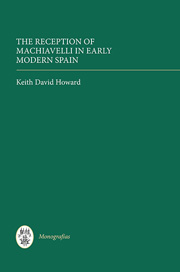Book contents
- Frontmatter
- Dedication
- Contents
- Acknowledgements
- Introduction
- 1 Medieval and Renaissance Humanist Political Discourse and Machiavelli
- 2 Machiavelli and Spanish Imperialist Discourse in the Sixteenth Century
- 3 Machiavelli and the Foundations of the Spanish Reason-of-State Tradition: Giovanni Botero and Pedro de Ribadeneyra
- 4 Machiavellian Discourse in the Hispanic Baroque Reason-of-State Tradition
- 5 Juan Pablo Mártir Rizo's Rereading of the Prince
- Conclusion
- Bibliography
- Index
4 - Machiavellian Discourse in the Hispanic Baroque Reason-of-State Tradition
Published online by Cambridge University Press: 05 September 2014
- Frontmatter
- Dedication
- Contents
- Acknowledgements
- Introduction
- 1 Medieval and Renaissance Humanist Political Discourse and Machiavelli
- 2 Machiavelli and Spanish Imperialist Discourse in the Sixteenth Century
- 3 Machiavelli and the Foundations of the Spanish Reason-of-State Tradition: Giovanni Botero and Pedro de Ribadeneyra
- 4 Machiavellian Discourse in the Hispanic Baroque Reason-of-State Tradition
- 5 Juan Pablo Mártir Rizo's Rereading of the Prince
- Conclusion
- Bibliography
- Index
Summary
At the turn of the seventeenth century, Spain was entering into a social, economic and political crisis, the consequences of which would last well beyond the end of the early modern period. The death of Philip II and the coronation of his son, Philip III, in 1598 inaugurated the practice of the valido or favorite, whereby the king's political power was wielded in practice by a grandee friend. While Philip II administered his kingdoms personally, Philip III handed over the responsibility of governing to his friend and mentor, Francisco Gómez de Sandoval y Rojas, Marquis of Denia and soon to be Duke of Lerma, who was less interested in governing than he was in accumulating land, wealth and titles for himself and his friends and family. When Philip III died prematurely in 1621, his 16-year-old son, crowned Philip IV, was already dominated by Gaspar de Guzman, Count of Olivares. The new favorite continued the practice of patronage established by his predecessor; yet he was much more interested in politics, and made it his life's goal to defend the Spanish empire, if not expand it, against encroachments by the English, French and Dutch, even while he never developed an adequate financial policy to fund this project.
Throughout this period, political writers addressed their advice on reason of state not only to the king, but also to the courtiers who were involved in policymaking, whether the king's favorite himself or members of the various councils that would submit advisory juntas to the king and his favorite. These writers make up a reason-of-state tradition, in the sense that we may assume that each writer who produced a new contribution to the tradition was familiar with the previous instances of the same tradition. Beginning with Maravall, historians have tended to divide these writers into three groups or “schools” based on their relationship to Machiavelli’s works.
- Type
- Chapter
- Information
- The Reception of Machiavelli in Early Modern Spain , pp. 97 - 128Publisher: Boydell & BrewerPrint publication year: 2014



